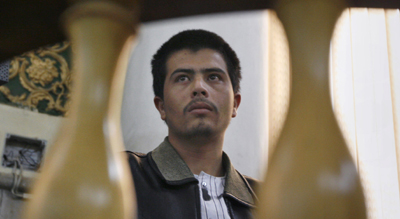CPJ urges PM Brown to investigate Farrell rescue
Dear Prime Minister Brown: The Committee to Protect Journalists wishes to offer our condolences on the loss of British Parachute Regiment Cpl. John Harrison, who died in a September 9 military operation to rescue two journalists kidnapped by Taliban forces in Afghanistan. We are grateful that New York Times reporter Stephen Farrell, a British-Irish national, was safely rescued, but we’re saddened by the loss of his colleague, fellow New York Times reporter Sultan Munadi.
Video Report: Portraits of the Fallen
In “Portraits of the Fallen,” a video introduction to CPJ’s database of killed journalists, María Salazar-Ferro examines the circumstances in which reporters, photographers, editors, and other journalists have died on duty. Because hundreds of journalists have been murdered in reprisal for their work, CPJ is leading a Global Campaign Against Impunity. (4:11) Visit our database of…
On dangerous assignments, risk becomes ‘normal’
David Rohde’s gripping five-part series on his abduction in Afghanistan and Pakistan ends today with his dramatic escape from his abductors. His series—and the reaction to it—bring into high relief the challenges that journalists face as they confront growing risk around the world. Rohde, for example, felt the need, both in his article and in…
CPJ writes Karzai: Afghan journalists fear retribution
Dear President Karzai: The Committee to Protect Journalists is concerned about conditions for journalists in Kandahar. Long destabilized by efforts to defeat the Taliban, the southern province has become even more dangerous since the recent presidential elections. Besides the daily threat of being caught up in an attack by insurgent groups, several local journalists tell CPJ they fear beatings, detentions, or worse in retribution for their reporting.
Afghan journalists call for justice in Munadi’s death
A large group of Afghan journalists met on Sunday in Kabul. They were angry about the death of New York Times journalist Sultan Mohammed Munadi in the September 9 British-led rescue attempt to free him and Times’ reporter Stephen Farrell, who survived unharmed, from kidnappers. After the meeting, they sent me a list of demands…
CPJ saddened by death of kidnapped translator
We issued the following statement after Afghan journalist Sultan Mohammed Munadi was killed during a raid to free him and his colleague, New York Times reporter Stephen Farrell. The two journalists had been kidnapped in the northern Afghan province of Kunduz on Saturday…

Amid woes, Kambakhsh release a moment to celebrate
We received great news that Parwez Kambakhsh, a 24-year-old Afghan journalist and student who was unjustly convicted of blasphemy and serving a 20-year term, was released from prison. But happiness over his release—the product of intensive advocacy by CPJ and others—is tempered by deteriorating press conditions overall in Afghanistan.